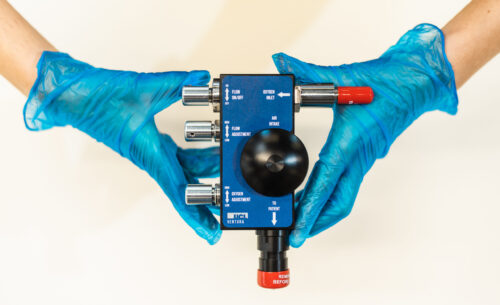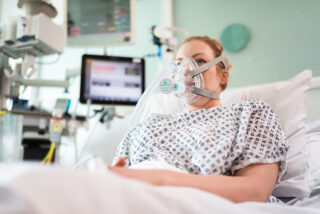Physical Sciences/Engineering
UCLB helps life-saving COVID-19 breathing aid to be shared around the world

UCLB’s technology transfer experts supported the team behind the UCL Ventura breathing device for managing COVID-19 patients to release the blueprints for manufacture so that governments and healthcare providers across the world could use these to rapidly build their own life-saving equipment.
In March 2020, with the Coronavirus crisis escalating in the UK, a team of UCL engineers, UCLH doctors and Mercedes-AMG High Performance Powertrains (Mercedes-AMG HPP) employees came together to work on a breathing device to support COVID-19 patients. Clinical data coming out of Italy and China indicated that the use of continuous positive airway pressure (CPAP) breathing aids could prevent approximately 50% of COVID-19 patients from requiring invasive mechanical ventilation. CPAP devices are non-invasive and work with close-fitting face masks as opposed to ventilators that require patient sedation and intubation. Crucially patients are awake and can be managed outside intensive care. Against the backdrop of rising pressure on hospital intensive care and the limited availability of CPAP devices, the team reverse-engineered an off-patent CPAP device for testing in just under 100 hours. Following successful healthy volunteer testing the UCL Ventura gained special MHRA regulatory approval in 10 days. Within a month they had manufactured and supplied 10,000 units to the NHS.
But with the pandemic surging across the world, the team came to UCLB for help with getting their life-saving technology into the hands of healthcare workers around the globe.
Weng Sie Wong is one of UCLB’s Senior Business Managers, who worked with the UCL academics developing the device.
“To make the biggest impact in the fight against the virus, the research team wanted the full set of UCL/ Mercedes manufacturing design files to be made widely available at no cost – but also to ensure the release was controlled.”
From idea to licensing platform in four days
Not only did the team face the challenge of putting in place legal agreements and a distribution platform to share the designs and manufacturing instructions internationally, they also found themselves working against the clock.
Marina Santilli, UCLB’s Associate Director of Physical Sciences & Engineering, recalls the conversation with Rebecca Shipley, professor of healthcare engineering at UCL, one of the core UCL Ventura team. “She said: ‘Every day that we can’t get these designs out, the more people are going to die.’ It really puts things into perspective – you drop everything.”
Having laid down the gauntlet, the UCLB team sprang into action. Saadat Nisar, Senior Counsel in the UCLB legal team and external lawyers worked over a weekend to draft and negotiate the terms of a joint IP ownership agreement between UCL and Mercedes and create the licence terms for sharing the technology.
Meanwhile, the project team behind UCLB’s innovative IP licensing system ‘e-lucid’ set about building a bespoke version of the platform (covid19research.uclb.com) to manage the process for receiving and approving licence applications and distributing the design files.
Global impact
The team’s efforts paid off when the scale of the initial demand became apparent. Within the first 48 hours of the new e-lucid licensing platform going live, it received over 800 applications. At its peak, the system was handling two applications a minute.
Fortunately, the system developers had the foresight to anticipate large volumes, and scaled the cloud-based system accordingly. They also built a new feature that allowed the applications review team to manage requests in bulk through a desktop- and mobile-accessible dashboard.
The e-lucid system also records contact opt-in permission where given by licensees, enabling the UCL Ventura team to follow up with the activity of those developing and using the design files around the world. With over 1,900 active licences in 105 countries, this creates an invaluable opportunity not only to support licensees with updates, but also to receive feedback from international teams as they develop and test their locally manufactured devices.

Making good on technology transfer’s COVID-19 pledge
UCLB’s ambitions to make a mark in the fight against COVID-19 don’t stop there. It has offered use of a dedicated COVID-19 licensing platform (covid19.e-lucid.com) to other universities and research institutes free of charge – provided that their technologies, from design files to modelling tools and patented methods, are also being offered at no cost for the duration of the pandemic.
Anne Lane, UCLB’s chief executive officer, says: “Universities around the world have mobilised to bring research expertise to bear on the coronavirus pandemic. UCLB’s work is all about getting brilliant ideas out into society where they can make an impact. So we’re committed to making IP available as quickly and efficiently as possible to help tackle COVID-19.”
By doing so, UCLB hope that they can build on the global impact of the project and continue to save lives around the world.